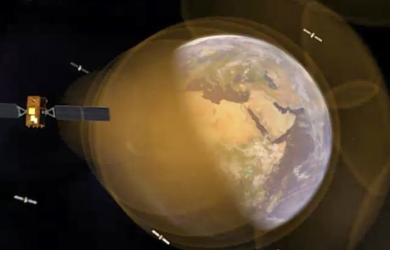United
Nations
Office for Outer Space Affairs
UN-SPIDER Knowledge Portal
The European satellite navigation mission Galileo marked a new success: On 25 April 2013, all four Galileo satellites started working as clocks accurate to a few billionths of a second, disseminating the exact time through their signals expressed as the UTC Universal Coordinated Time global standard.
“A billionth of a second equals a nanosecond, a time interval far beyond our own human capacity of appreciation,” explains Marco Falcone, ESA’s Galileo System Manager.
ESA explains the necessity of Galileo to work as precise clocks: "Galileo, like all other satellite navigation systems, is based on the highly precise measurement of time. A receiver on the ground pinpoints its position by calculating how long signals from satellites in orbit take to reach it. Matching the receiver and satellite clocks then multiplying the time taken by the speed of light gives the range between user and satellite, allowing the receiver to fix its own location relative to four or more satellites.
